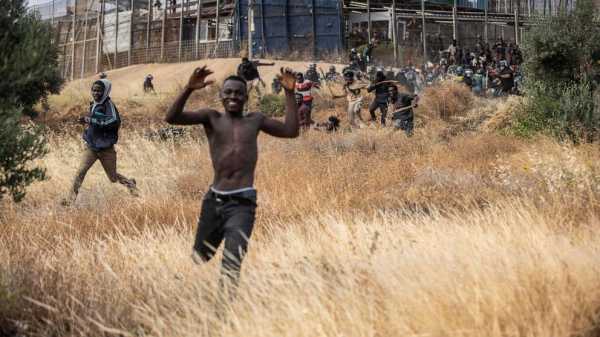
MADRID — Rights groups on Friday denounced a lack of justice and transparency over the deaths of at least 37 migrants last year during a mass attempt to cross the border from Morocco into the Spanish enclave city of Melilla.
Ahead of the tragedy's first anniversary on Saturday, Amnesty International said the Spanish and Moroccan authorities were “preventing attempts to find the truth" of what happened when up to 2,000 African migrants tried to climb a border wall and dozens were crushed, beaten and denied medical attention by security forces at the “Barrio Chino” border crossing.
The independent Spanish Commission for Refugees, also known by its Spanish acronym CEAR, ordered authorities to clarify what happened that day for “truth, justice and reparations," and demanded the launch of an independent investigation after prosecutors shelved the only state probe into the deaths in December.
“This leaves the door wide open for such a tragedy to happen again, endangering the lives of thousands of people seeking refuge," said Estrella Galán, CEAR’s general director.
Amnesty noted that the families of 76 people who remain missing after the tragedy were still waiting for answers, and that Spain and Morocco both had failed to provide a full list of victims’ names, or any footage of the tragedy.
“Bodies are still lying in a morgue and in graves and efforts to identify the dead and inform their relatives have been blocked,” said Amnesty International Secretary General Agnès Callamard.
Spain’s interior ministry has repeatedly denied that any deaths occurred on Spanish soil, and maintained this stance in an emailed statement to the Associated Press on Friday. “No tragic event took place in Spain and the actions of the agents of the state security forces were irreproachable,” the statement said.
“Amnesty International and CEAR confuse the lack of support for their story with an alleged lack of investigation,” it added, saying the Spanish Attorney General’s Office had “corroborated” the ministry’s findings.
Moroccan officials did not respond to requests for comment on the eve of the tragedy’s anniversary, and it has received no coverage in the official Moroccan media.
Organizations like CEAR have long criticized the Spanish government for the physical and bureaucratic obstacles asylum seekers face while seeking safe harbor. Spain’s acceptance rate for asylum-seekers’ claims is well below the European average.
Amnesty further alleged that Spain has continued illegal forced expulsions at the Moroccan border since the deadly attempted border crossing, while the warming of relations between the two countries means Morocco forcibly prevents asylum-seekers from reaching the Spanish side to apply for international protection.
“What happened in Melilla is a salutary reminder that racist migration policies aimed at fortifying borders and restricting safe and legal routes for people seeking safety in Europe have real and deadly consequences," Callamard said.
The rights groups' call for action comes during a harrowing month for migrant deaths in the Mediterranean.
This week, the bodies of a man and a child were retrieved from waters off the western coast of Morocco, Spain’s Maritime Rescue service said Wednesday. Spanish NGO Caminando Fronteras said the dinghy they were traveling in was left for 12 hours without help, and 39 people on board died.
The Spanish coast guard told media on Friday it had asked Moroccan authorities to aid the shipwreck, amid criticism this delayed the arrival of help. Morocco took charge of the rescue as the boat was floating in a shared Search and Rescue zone but closer to Moroccan territory, the Spanish side said.
Spanish rescuers had just attended to another boat in distress and needed to return to port to provide some of the passengers with medical attention, they added.
Spain's ombudsman announced on Friday it was looking into the case and requesting information on the cooperation between the two sides, and how the rescue operation unfolded.
Meanwhile, the number of confirmed deaths from one of the worst-ever migrant shipwrecks in the Mediterranean rose to 81 Monday after three more bodies were found off southern Greece. The Greek coast guard has also been widely criticized for not trying to rescue the migrants before their vessel sank.
Sourse: abcnews.go.com






